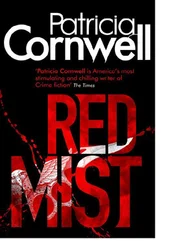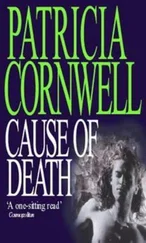“If they’re using her instead of the robot, then whatever’s in that box isn’t motion-sensitive,” Scarpetta said. “They must be certain of that.”
“If it was motion-sensitive, I guess we’d be peeling you off the moon, since you carried it up to your apartment,” Marino said with his usual diplomacy.
“It could be motion-sensitive and on a timer. Obviously, it’s not,” Benton said.
Police kept people back, making sure no one was within at least a hundred yards of the bomb tech as she made her way down the building’s front steps, her face obscured by a visor. She walked slowly, somewhat stiffly but with surprising agility, toward the truck, its diesel engine throbbing.
“They lost three responders in Nine-Eleven. Vigiano, D’Allara, Curtin, and the bomb squad lost Danny Richards,” Marino said. “You can’t see it from here, but their names are painted on the bomb truck, on all the trucks at the Two. They got a little memorial room in there, off the kitchen, a shrine with some of the guys’ gear recovered with their bodies. Keys, flashlights, radios, some of it melted. Gives you a different feeling when you seen a guy’s melted flashlight, you know?”
Scarpetta hadn’t seen Marino in a while. Inevitably, when she came to New York, she was overscheduled and somewhat frantic. It hadn’t occurred to her that he might be lonely. She wondered if he was having problems with his girlfriend, Georgia Bacardi, a Baltimore detective he’d gotten serious about last year. Maybe that was over or on its way to being over, and if so, no big surprise. Marino’s relationships tended to have the life span of a butterfly. Now Scarpetta felt worse. She felt bad about carrying a package upstairs without examining it first, and she felt guilty about Marino. She should check on him when she was in the city. She should check on him even when she wasn’t, a simple phone call or e-mail now and then.
The bomb tech had reached the truck, and her booted feet gripped the serrated tread on the ramp as she climbed up. It was difficult to see past Marino, out the window and down the street, but Scarpetta recognized what was happening, was no stranger to the procedure. The tech would set the frag bag on the tray and slide it back inside the TCV. Using the winch control, she would retract the steel cable to pull the massive steel lid back over the round opening, then replace the spider yoke and tighten it, likely with her bare hands. At most, bomb techs wore thin Nomex gloves or maybe nitrile to protect them from fire or potentially toxic substances. Anything heavily padded would make it impossible to perform the simplest task and probably wouldn’t save fingers in a detonation anyway.
When the tech was done, other cops and Lieutenant Lobo convened at the back of the bomb truck, sliding the ramp back in place, covering the containment vessel with the tarp, buttoning up. The truck roared north on the sealed-off street, marked units in front and back, the convoy a moving sea of rapid bursts of light headed for the West Side Highway. From there it would follow a prescribed safe route to the NYPD range at Rodman’s Neck, probably to the Cross Bronx and 95 North, whatever would best buffer traffic, buildings, and pedestrians from shock waves, a biological hazard, radiation, or shrapnel, should a device explode en route and somehow defeat its containment.
Lobo was walking toward them. When he reached Marino’s car, he climbed into the back next to Benton, a rush of cold air washing in as he said, “I had images sent to your e-mail.” He shut his door. “From the security cameras.”
Marino began typing on the Toughbook clamped into the pedestal between the front seats, the map of White Plains replaced by a screen asking for his username and password.
“Your FedEx guy’s got an interesting tattoo,” Lobo said, leaning forward, chewing gum. Scarpetta smelled cinnamon. “A big one on the left side of his neck, kind of hard to see because he’s dark-skinned.”
Marino opened an e-mail and loaded the attachment. A still from a security video recording filled the screen, a man in a FedEx cap walking toward the concierge desk.
Benton repositioned himself to get a better look and said, “Nope. Got no idea. Don’t recognize him.”
The man wasn’t familiar to Scarpetta, either. African American, high cheekbones, beard and mustache, the FedEx cap pulled low over eyes masked by reflective glasses. The collar of his black wool coat partially obscured a tattoo that covered the left side of his neck, up to his ear, a tattoo of human skulls. Scarpetta counted eight skulls but couldn’t see what they were piled on top of, just a linear edge of something.
“Can you enlarge it?” She pointed at the tattoo, at what looked like the edge of a box that with a click of the trackpad got bigger. “Maybe a coffin. Skulls piled inside a coffin. Which immediately makes me wonder if he’s served in Iraq or Afghanistan. Skulls, skeletons, skeletons climbing out of coffins, tombstones. Memorials for fallen soldiers, in other words. Usually, each skull represents a lost comrade. Tattoos like this have become popular in the last few years.”
“The RTCC can do a search on it,” Marino said. “If this guy’s in the database for some reason, maybe we can get a hit on his tattoo. We got a whole database of tattoos.”
The sharp scent of cinnamon returned, reminding Scarpetta of fire scenes, of the symphony of unexpected odors in places that had burned to the ground. Lobo touched her shoulder and said, “So, nothing about this guy’s familiar. Doesn’t bring anything to mind.”
“No,” she said.
“Looks like a mean bastard,” Lobo added.
“The concierge, Ross, said there wasn’t anything about him that was cause for alarm,” Scarpetta said.
“Yeah, that’s what he said.” Chewing gum. “Course, he also got the job in your building because he was out of work after getting fired by the last building. For leaving the desk unattended. Least he was honest about it. Course, he failed to mention he was charged with possession of a controlled substance last March.”
“We sure he’s got no connection with this guy?” Benton meant the man on the computer screen.
“Not sure of anything,” Lobo said. “But this guy?” Indicating the man with the tattooed neck. “He’s probably not FedEx, to state the obvious. You can buy caps like that on eBay, no problem. Or make one. What about when you were walking back from CNN?” Lobo asked Scarpetta. “You see anyone, especially anyone that for some reason caught your eye?”
“A homeless person sleeping on a bench is all that comes to mind.”
“Where?” Benton asked.
“Near Columbus Circle. Right there.” Scarpetta turned around and pointed.
She realized the emergency vehicles and the curious were gone, and halogen lights had been extinguished, the street returned to incomplete darkness. Soon traffic would resume, residents would reenter the building, and traffic cones, barriers, and yellow tape would vanish as if nothing had happened. She knew of no other city where emergencies could be contained so rapidly and the usual order of things resumed just as fast. The lessons of 9/11. Expertise at a terrible price.
“Nobody in the area now,” Lobo said. “Nobody on any benches, but all this activity would have cleared them out. And nobody else caught your eye when you were walking home?”
“No,” Scarpetta replied.
“It’s just that sometimes when people leave antisocial presents, they like to hang around and watch or show up after the fact to see the damage they caused.”
“Any other photos?” Benton asked, his breath touching Scarpetta’s ear and stirring her hair.
Marino clicked on two more video stills, displaying them side by side, full-length shots of the man with the tattoo walking through the apartment building lobby, toward the desk, and away from it.
Читать дальше












